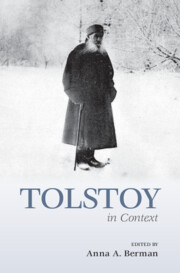Book contents
- Tolstoy in Context
- Tolstoy in Context
- Copyright page
- Contents
- Figures
- Notes on Contributors
- Preface
- Acknowledgments
- Note on Citations, Translations, and Transliterations
- Chronology
- Part I The Man
- Part II Russian Social and Political Contexts
- Part III Literature, the Arts, and Intellectual Life
- Part IV Science and Technology
- Chapter 25 The Mechanized World
- Chapter 26 The Natural World
- Chapter 27 Darwin and Natural Science
- Chapter 28 Medical Science
- Part V Beyond Russia
- Part VI Tolstoy’s Afterlife
- Suggested Further Reading
- Index
Chapter 27 - Darwin and Natural Science
from Part IV - Science and Technology
Published online by Cambridge University Press: 05 January 2023
- Tolstoy in Context
- Tolstoy in Context
- Copyright page
- Contents
- Figures
- Notes on Contributors
- Preface
- Acknowledgments
- Note on Citations, Translations, and Transliterations
- Chronology
- Part I The Man
- Part II Russian Social and Political Contexts
- Part III Literature, the Arts, and Intellectual Life
- Part IV Science and Technology
- Chapter 25 The Mechanized World
- Chapter 26 The Natural World
- Chapter 27 Darwin and Natural Science
- Chapter 28 Medical Science
- Part V Beyond Russia
- Part VI Tolstoy’s Afterlife
- Suggested Further Reading
- Index
Summary
Lev Tolstoy was not hostile to the natural sciences, although the impression that he was is understandable given his critical remarks about contemporary medicine. Throughout his life, Tolstoy remained consistently aware of developments in the natural sciences, and if some of his polemical representations about them are taken out of context, it is possible to misinterpret his positions. This chapter places three of his more prominent negative engagements with the sciences in context to show how those views emerged from specific local circumstances. First, his dismissal of university education in the sciences is juxtaposed with his own education in Kazan. Second, his very prominent rejection in Anna Karenina of Charles Darwin’s theory of evolution by natural selection adopted a specific ethical stance in the context of a vibrant Russian debate about the biological and philosophical limitations of Darwinism. And, finally, his satirizing of séances and “spiritualism” in his play The Fruits of Enlightenment is examined as emerging from his domestic surroundings.
Keywords
- Type
- Chapter
- Information
- Tolstoy in Context , pp. 222 - 229Publisher: Cambridge University PressPrint publication year: 2022

